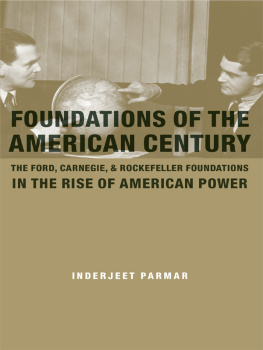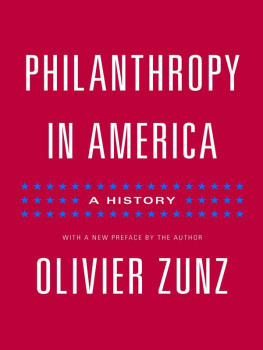FOUNDATIONS OF THE AMERICAN CENTURY
FOUNDATIONS OF THE AMERICAN CENTURY |
The Ford, Carnegie, and Rockefeller Foundations in the Rise of American Power
INDERJEET PARMAR
COLUMBIA UNIVERSITY PRESS New York

Columbia University Press
Publishers Since 1893
New York Chichester, West Sussex
cup.columbia.edu
Copyright 2012 Columbia University Press
All rights reserved
E-ISBN 978-0-231-51793-5
Library of Congress Cataloging-in-Publication Data
Parmar, Inderjeet.
Foundations of the American century : the Ford, Carnegie, and Rockefeller Foundations in the rise of American Power / Inderjeet Parmar.
p. cm.
Includes bibliographical references and index.
ISBN 978-0-231-14628-9 (cloth : alk. paper)ISBN 978-0-231-51793-5 (e-book)
1. Ford FoundationHistory 2. Carnegie Foundation for the Advancement of TeachingHistory. 3. Rockefeller FoundationHistory. 4. United StatesForeign relations20th century. I. Title.
HV97.F62P37 2011
327.7300904dc23
2011029190
A Columbia University Press E-book.
CUP would be pleased to hear about your reading experience with this e-book at .
References to Internet Web sites (URLs) were accurate at the time of writing. Neither the author nor Columbia University Press is responsible for URLs that may have expired or changed since the manuscript was prepared.
CONTENTS
It is a pleasure to acknowledge debts incurred on the way to researching and writing this book. It has been many years in the making; indeed, we have become somewhat attached to each other. I do wonder how I will get along without it, this simultaneously enjoyable, stimulating, educational, but occasionally frustrating long-term relationship.
I have received enormous assistance at various stages of this book project. Colleagues and friends have generously given up their time to discuss ideas, read draft chapters or conference papers, and listen to my not uniformly upbeat accounts of the books progress. Thanks to all of the following for their time and patience: Bob Arnove, Paul Cammack, Phil Cerny, Mick Cox, Nick Cullather, Michael Doyle, Rosaleen Duffy, John Dumbrell, Donald Fisher, Nicolas Guilhot, Jon Harwood, Doug Jaenicke, Matthew Jones, Dino Knudsen, John Krige, Mark Ledwidge, Leo McCann, Linda Miller, Mick Moran, Craig Murphy, Alex Nunn, Pierre-Yves Saunier, Giles Scott-Smith, Diane Stone, Srdjan Vucetic, and Japhy Wilson. I owe a significant debt to Ralph Young, a wonderfully warm and insightful former colleague, who asked me the question during a seminar presentation that led to my thinking of U.S. foundations as an aspect of American political development. If I have forgotten anyone Ive exploited over the years, please do forgive me. Any errors or omissions are my responsibilityalthough, as a sociologist, I appreciate the social basis of those impostors, success and failure!
I am very grateful to the archivists who take care of and make available to scholars the historical records of the Big Three foundations. In particular, Alan Divack and Anthony Maloney were absolutely wonderful during the several weeks I spent in the basement reading room at the Ford Foundation. I especially enjoyed our chats over doughnuts and coffee on Friday mornings. I remember our hopeful discussions about John Kerrys chances of defeating George W. Bush for the White House in 2004. Alans knowledge and understanding of the foundations records was incredibly helpful, as were his comments regarding the nature of the foundation itself. Anthony was just amazing; he was always there for me, making my time at Ford productive and congenial. Thanks to you both. At a later stage, Idelle Nissila seamlessly took over from Anthony, assisting me with locating documents long after I had begun writing this manuscript.
Tom Rosenbaum at the Rockefeller Archive Center was always helpful, encouraging, interested in my work, and very knowledgeable. I missed him during my last visit and hope he is enjoying his retirement. Darwin Stapletons friendly helpfulness was also much appreciated. The station wagon that the RAC uses to ferry researchers to and from Tarrytown station was also very welcoming and helpful. Thank you!
The records of the Carnegie Corporation and other Carnegie philanthropies are located at the Rare Books and Manuscripts Collection at the Butler Library, Columbia University. It is a marvelous facility with an excellent staff. Thanks to you all, especially Brenda Hearing and Jane Gorjevsky, curators of the Carnegie collections, for your untiring efforts. Despite the wintry conditions that often prevailed in the reading room (thanks to a superefficient air conditioning system), I always felt very warmly welcome there.
The British Academy, the Arts and Humanities Research Board, and the University of Manchester provided funds and research leave, which enabled me to spend several months in the United States over many years. Some aspects of the book benefited from the work of the SSRCs initiative on think tanks, led by Nicolas Guilhot and Tom Asher, in the wake of the Iraq War. I am in their debt. Finally, generous research leave from the university upon completing a term as head of politics was essential to the completion of this book.
At Columbia University Press, Peter Dimock proved an excellent commissioning editor, sharp publishing adviser, and all-round caring and warm human being. We met after a conference panel at the International Studies Association convention in Chicago in 2007 (I think) and, during our chat, he suggested I put together a book proposal for Columbia to consider. To say that that was a very welcome invitation would be an understatementit was music to my ears! Thanks also to Peters assistant, Kabir Dandona. Since Peters departure, Philip Leventhal has been extremely helpful with editorial advice and, not to mention, generous with granting greatly appreciated deadline extensions!
Much of the time taken to research and write this book was stolen from my family. My childrenRohan, Nikhil, and Indiawere very young (four and two years and not even a twinkle in the eye, respectively) when work on this book began in the late 1990s. In their own ways, they have contributed to the books completion. India is a welcome distraction, giggling chaos and random observations on legs; Rohan, a keen historian. Nikhil was especially helpful without knowing it: his ability to focus and dedicate every spare momentwhen still a primary-school pupilincluding fleeting moments in the car park before school to additional homework was inspiring. Because of him, I began using the car as a study space as well.
But I dedicate this book to my wife and best friend, Meera: she enables everything, including me.
And it may be that he who bestows the largest amount of time and money on the needy is doing the most by his mode of life to produce that misery which he strives in vain to relieve.
Henry David Thoreau, Walden (1854)
American expansion has been characterized not by the acquisition of new territories but by their penetration. a variety of organizations, governmental and nongovernmental, have attempted to pursue the objectives important to them within the territory of other societies.
Samuel P. Huntington, Transnational Organizations in World Politics (1973)
When [Bill] Gates first started the charity organization, he sought advice from Vartan Gregorian, president of the $2.2-billion-US Carnegie Corporation of New York Bill Gates always has believed that with wealth comes responsibility, the same as Andrew Carnegie, said Gregorian. There are people who deal with symptomssomebody is poor, you give money. Thats charity. Philanthropy is to solve problems through investment and planning, not (just) through generosity.










